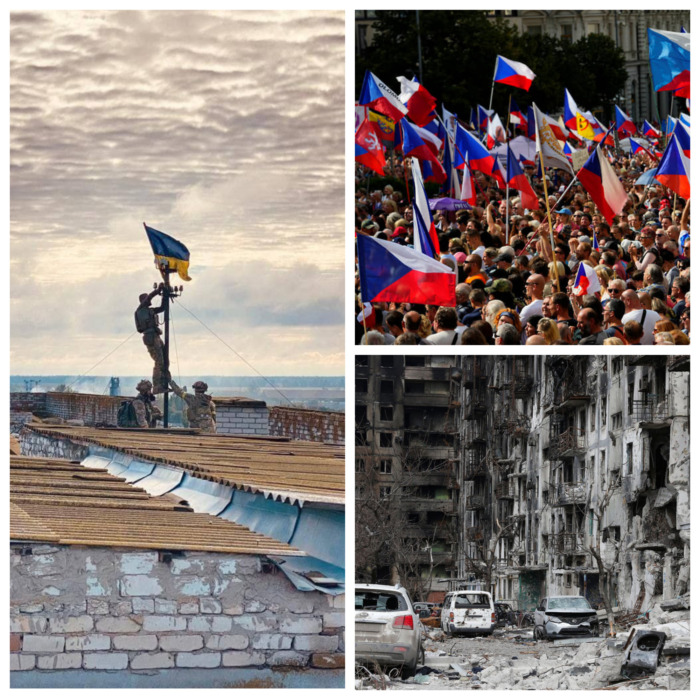If they don’t like it, we’ll turn off the gas. Why it is impossible to succumb to Moscow’s energy blackmail
05.09.2022If they don’t like it, we’ll turn off the gas. Why it is impossible to succumb to Moscow’s energy blackmail.

If they don’t like it, we’ll turn off the gas. Why it is impossible to succumb to Moscow’s energy blackmail
And, if it is impossible to succumb to blackmail, then what should be done?
Last Saturday, at the Leuseni checkpoint, Moldovan customs officers found in a minibus traveling from Russia, flags with Z and V symbols, prohibited in Moldova, and camouflage equipment with these symbols, images of tanks, and the Russian Nazi inscription “Strength is in Truth”. The cargo has been seized. The driver, who has dual citizenship of Moldova and Russia, and who was driving in Moldovan license plates in a roundabout way, bypassing Ukraine, entering Moldova from Romania, was detained and is giving evidence.
On the same day, about 70,000 people protested in Prague, demanding the lifting of anti-Russian sanctions as damaging Czech businessmen, as well as stopping the weapons supply to Ukraine. What percentage of these 70 thousand were Russians permanently residing in the Czech Republic, the official news was silent. But, according to the Prague residents, there were about a third of Russian citizens with a Czech residence permit, and possibly more.
Both episodes, different in significance and scale, are parts of the same picture. This is the beginning of another Moscow special operation to riot Europe in the winter.
What is Moscow seeking?
Moscow directly linked the volume of gas supplies to Europe and the prices for the supplied gas with the level of support for Ukraine. More support means less supply, and gas is more expensive. If you don’t want it, don’t take it: GAZPROM will burn excess gas on the border with Europe, and is already burning it, for about $300 million per month (according to Russian data). Or, if it can, it will sell gas, as well as oil, to China or India — in the volumes in which they still take it. Yes, it will sell them fossil fuels at a bargain price, but the European countries that help Ukraine repel Russian aggression will not get Russian gas.
Once upon a time it might have worked. But Moscow’s problem today is that Europe, from a certain moment, has ceased to succumb to gas blackmail, at least at the level of most European politicians. Collective Europe, represented by EU members and candidates for membership, made a political decision to help Ukraine and establish an inviolable frontier between Russia and Europe along the 1991 Russian-Ukrainian border. But this requires efforts, primarily military ones. Russia’s solid borders stop only where it suffers a heavy military defeat, without any hope of revenge — and this is confirmed by the whole of Russia’s history.
Now Russia, having lost the opportunity to influence European politicians directly, wants to influence them from below, through the ordinary European voter. To do this, Russians hope to freeze ordinary Europeans by organizing a shortage of gas and electricity, then upset them with high bills, artificially inflating gas prices, and, finally, pushing them to street protests, promising cheap gas in exchange for the surrender of Ukraine.
And in order for this special operation to be successful, Russian agents are now conducting a preliminary buildup of the situation. They sow panic in connection with the allegedly impending energy catastrophe, prepare the organizing committees of future protests and deliver the necessary props for them. The protests that we see today in the Czech Republic and in Moldova are only rehearsals for the riot wave that Moscow wants to bring down on the streets of European cities this winter.
How real is the energy collapse in Europe?
It is the collapse, on the verge, or beyond the border of a humanitarian catastrophe, that is absolutely unrealistic in Europe. The European Union is well prepared even for a complete cessation of Russian gas supplies. Thanks to the partial diversification of supplies, gas storage facilities in the EU are already filled by about 80%, in Germany — by 85%. But energy prices have risen sharply nonetheless. Actually, Ukraine has offered its gas storage facilities (with their volume of 30 billion cubic meters) to the EU. And, precisely because of the rise in energy prices, the winter will not be catastrophic, but very difficult. Absolutely all prices are tied to energy, and, therefore, life in Europe will definitely become more expensive.
Moreover, gas prices might grow only in Europe, since the average price of the volume of gas required for the production of 1 BTU (BTU, British thermal unit, approximately equal to 252 cal) in different world regions has recently fluctuated significantly. For North America it is $6.60, for East Asia it is $32.00, and for Europe it is $68.00. Such a huge gap in energy prices affects, among other things, affects European business, making it uncompetitive.
Generally speaking, “average prices” are the “average body temperature in a hospital”. Prices under long-term contracts are usually lower than spot prices on the exchange, where free volumes of gas are sold “here and now”. But let’s not go into these details, but ask ourselves three questions:
- Why such a gap in prices across regions? Why hasn’t there been a market equalization of prices by offering additional volumes of gas to places where there is a paid demand for it?
- Why did the price of gas rise sharply in Europe?
- What will happen next?
Reasons for the rise in price
The gap in regional prices is due to logistics and politics. Gas, as you know, can be transported in two ways. Either through pipes, which is cheaper, but requires a permanent infrastructure that cannot be deployed from point to point. Or by gas carriers, in liquefied form, which is already more expensive, and which also requires a complex infrastructure: gas must be liquefied, loaded onto tankers, taken from them and fed again in the form of gas to the pipeline, otherwise delivered to the consumer by land gas carriers in liquid form.
In any case, the supply of gas from one point to another, from a well to a consumer, is a very conservative thing. It is difficult to reconnect a consumer to a new gas source, or to connect a gas source to a new consumer. It is costly in terms of money, and it takes time, measured in years.
Half a century ago, Europe, succumbing to the mirage of “peaceful coexistence”, staked on Russian gas. In the 70s, it looked promising: relatively inexpensive and fairly reliable. It was more expensive to transport gas by tankers from the USA or from the Middle East, the situation in the USSR seemed stable and predictable, and there were no alternative fields discovered nearby.
In principle, it was possible to buy gas from the USSR — why not? True, with a caveat: without increasing dependence on Moscow gas supplies to a critical level. But the Europeans ignored the advice of Ronald Reagan and forgot the history of their relationship with the Muscovites. Meanwhile, Russia has always sought to become a monopoly supplier of important raw materials, in order to, having received an exclusive position, then to induce the buyer to make political concessions. Over Russian salon conversations that “we will stop selling them” furs, wood or bread — and them in Europe, will die of cold or hunger, satirists chuckled back in the 19th century. In other words, the current situation could have been foreseen ten, twenty and thirty years ago.
In the current situation, Russia has begun to use the European gas peg to cover up its military adventures: in Chechnya, Moldova, Georgia, Syria, Ukraine. For some time, Europe followed the Kremlin’s lead, its gas dependence was very strong and the price of abandoning it was high. And only after the start of the war in Ukraine, in 2014, Europe began to seriously think about diversifying supplies.
However, the European geography, existing fields, pre-existing logistics and opportunities to build new routes all combined to keep Russian pipeline gas as the cheapest option. Naturally, in the event that gas prices were not artificially pumped up. The new logistics, passing through the territory of many states, required high costs, complex political decisions and large-scale security measures. And the Kremlin, using all possible levers, from local military conflicts to outright corruption of European politicians, sought to make it difficult to reduce European dependence on its gas supplies.
In other words, the rejection of Russian gas was difficult. In addition, in Europe, there has been a great deal of wishful thinking, as for a long time the Europeans hoped that the Kremlin would come to its senses and stop the aggression, returning to peaceful business. This was obviously impossible because of the very nature of the Moscow regime, destructive and deeply hostile to the outer world. But the Europeans really wanted to believe in peaceful coexistence and profitable business with Moscow. Including those who, according to their position, were not supposed to believe that blindly, just “because they really wanted to”, but to think, analyze, study the essence of the problem and calculate options. In other words, the current price crisis is a direct consequence of a series of gross failures by European politicians and experts who fell for the Kremlin’s gas bait.
With the beginning of the hot phase of the war in Ukraine on February 24, 22, Europe has accelerated the transition to non-Russian sources of gas supply, and on gas delivery routes that do not pass through Russia. This has become one of the ways to financially influence the Kremlin, in order to at least make it more difficult for him to wage war. In response, Russia began to artificially reduce gas supplies, doing it faster than the Europeans had time to build new logistics from alternative sources of gas supply. This is what caused the current surge in European prices.
Will the price increase be permanent? In the medium term, no, it won’t. Over the past half century, many new gas fields have been discovered, with the possibility of creating convenient logistics. In the next 2–3 years, gas prices for Europeans may drop on a large scale. A steady decline will begin in the spring-summer of 2023. Thus, this winter of 2022–23 is the last chance for the Kremlin to carry out a successful gas blackmail. And, there is no doubt that the Kremlin will use this chance to the fullest.
Enduring or giving in
Anyone who has ever experienced blackmail knows that giving in to the blackmailer’s demands can only whet his appetite. The proper way to deal with a blackmailer is to inflict pain and damage on every demand. Not just not to succumb to blackmail and take blows, but to attack hard in response. You can’t be afraid of the blackmailer, he himself should start to be afraid of you. And a draw, a win-win is not allowed in this case. The blackmailer must be finished off. If he is not finished off, then, having recovered, sooner or later he will make a new attempt.
What will Europe gain by losing Ukraine to Russia? First of all, it will receive a wild genocide of Ukrainians throughout the Ukrainian territory occupied by Russia. A genocide on such a scale that the atrocities of Pol Pot, Ieng Sary and the Kim dynasty will all together go pale in comparison. Hitler, next to this genocide, will look like a hooligan boy who is easy to scold severely. The whole real history of Russia consists of the genocides of the conquered peoples, in order to finally break their resistance. It was the Ukrainians who survived at least a dozen Russian genocides, including the Holodomor of the 30s of the XX century, which the West, while profitably trading bread with the Bolsheviks, chose not to notice then. This bread, by the way, was taken from Ukrainian peasants who were dying of hunger.
Is Europe ready to ignore genocide of Ukrainians even now? Is it ready to push millions of Ukrainian refugees back to Russian-occupied Ukraine, to certain death, and not let new ones in? Is she ready to breathe for years the smell of millions of corpses of executed and starved Ukrainians, burned by Russians in crematoria, powered by cheap Russian gas?
But that’s not all. Moscow openly says that, following Ukraine, Moldova and the three Baltic countries should also be conquered, annexed to Russia and subjected to reorganization in the Russian-imperial spirit, with the destruction of all elements disloyal to Moscow. There, in these countries, if they are also handed over in exchange for cheap gas to Russia, exactly the same thing will happen that is now happening in the occupied part of Ukraine: filtration camps for the civilian population, executions of those whom the occupiers considered disloyal, the removal of children from those disloyal to the occupiers parents. The loyalists face the indifference of the occupiers, hunger and cold, and a humanitarian catastrophe in the coming winter. The reality is that most of the Ukrainians, who will not be able, one way or another, to get out of the Russian-occupied territories, will simply not survive this winter. Is Europe ready to agree to this in exchange for cheap gas: to throw not only Ukraine, but also four other countries, three of which are NATO members into the Moscow firebox?
But even that’s not all! The Kremlin’s next target is Poland. And the Czech Republic, in the capital of which 70,000 protesters called for capitulation to Moscow, the Kremlin will swallow just on the move without even delving into what exactly it is eating, the Czech Republic without garnish. Moscow declares this openly. Czechs, do you really want this?
The Kremlin will continue to expand until it is stopped by force of arms. This is a given, and there is no getting away from it. So wouldn’t it be better to do it right now, without giving him anything else? But then you will have to resist Moscow’s gas blackmail and endure high gas prices this winter. Unity is key to victory over the inhuman dark power.
What can comfort the Europeans? Firstly, such a winter will still be the only one. After, the Kremlin will no longer have opportunities for gas blackmail – the window of opportunity for Russia is closing right before our eyes. Energy prices will go down sharply in the spring. Secondly, the inhabitants of Europe, due to a solid social cushion, will still be better off than the Ukrainians. The Kremlin plans to arrange the main hell in the winter in Ukraine, systematically destroying the entire Ukrainian energy sector, including nuclear power plants, and knocking out distribution stations. But the Ukrainians, already knowing exactly what the occupation means, are not going to give up, although it will be a very difficult winter.
Finally, and this is the main thing: Russia will inevitably face capitulation, followed by retribution. Even now, the Russian army is fighting in Ukraine with old Soviet weapons, and is throwing into battle criminals who have been amnestied in exchange for agreeing to fight, since there are no other volunteers left. Of course, Russia will not collapse tomorrow, but its back is already broken. A year or two, maybe three, and Russia will pay for everything. And not only for the crimes committed in Ukraine, but also for what was committed by Russians earlier and in other places. And for the hard European winter, with all the losses that the Europeans will suffer, Russia will also pay.
For this to happen, we all need to unite, stand firm and turn the neck of Moscow Nazism, as it was once turned to Nazism of Hitler. Then, having put the ringleaders on the dock in the new international tribunal, the rest of Russia will get a harsh but fair bill.
With gas included.
 Sergey Ilchenko, for Newssky
Sergey Ilchenko, for Newssky

